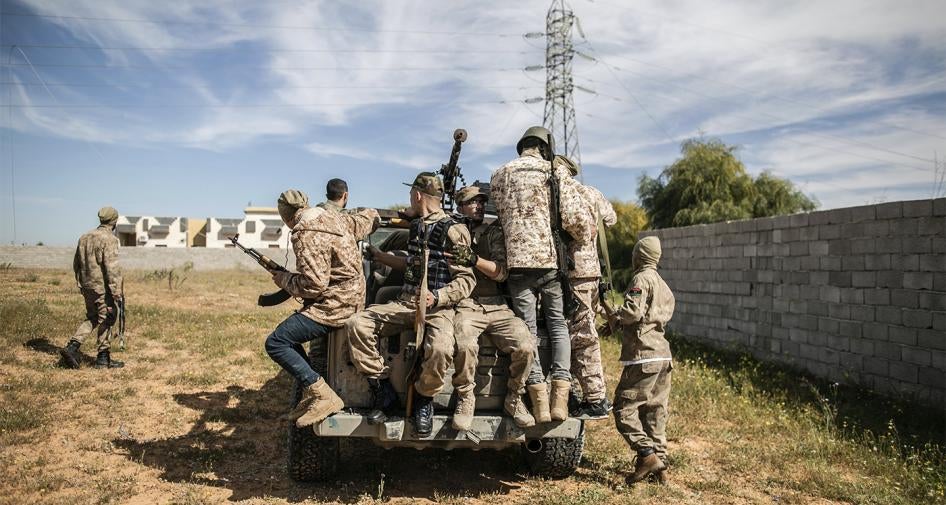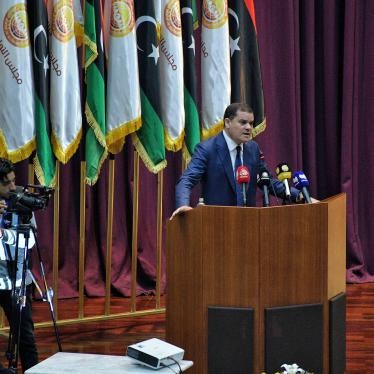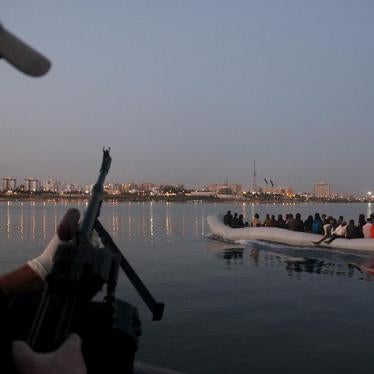Chancellor Angela Merkel took the initiative almost two years ago to resolve the Libya crisis by creating a joint effort called The Berlin Process. Germany has positioned itself as mostly neutral putting it in a favorable position to broker political discussions.
Germany will host the Second Berlin Conference on Libya, on June 23, to build on a ceasefire agreement signed between conflict parties last October and to “focus on preparations for the national elections scheduled for 24 December and on the withdrawal of foreign troops and mercenaries from Libya.” They will also discuss “steps towards the creation of unified Libyan security forces,” according to Foreign Minister Heiko Maas and United Nations Secretary General Antonio Guterres, the joint hosts of the conference. But Germany should also steer this second conference to address systematic and grave human rights abuses by Libyan armed groups and government authorities, and publicly call for accountability. The states that participated in the first Berlin meeting in January 2020, including the United States, some EU member states, Russia, Turkey and the UAE are expected to attend alongside the current interim Libyan Government of National Unity (GNU).
Since the conclusion of the first Conference in 2020, Germany and participants did not prioritize justice and accountability despite the formation of a Working Group on Human Rights and a commitment to urge all parties to respect international humanitarian law and human rights. Libyan authorities have all but ignored conference conclusions on human rights that included ensuring due process, ending arbitrary detention and ensuring accountability for serious violations. The fighting in Libya ended last June, after a 14-month conflict between armed groups that supported the Tripoli-based former Libyan Government of National Accord and the armed group based in eastern Libya known as Libyan Arab Armed Forces. The guns have largely stayed silent and the UN-brokered deliberations between Libyan factions and experts known as the Libya Political Dialogue Forum, resulted in the establishment of the GNU.
It proceeded to a swift and non-violent takeover in March of the former Government of National Accord in Tripoli and the merger with the Interim Government in eastern Libya. Foreign diplomatic missions including the European Union announced in recent weeks the reopening of embassies in Tripoli. Foreign dignitaries—Foreign Minister Maas was among the first-- have visited Tripoli since the GNU was sworn in by the House of Representatives on March 15.
Libyan authorities still depend on armed groups for their security, though, and the political situation remains fragile, indicating how precarious the current ceasefire is. The risk is magnified by continued involvement of outside states such as Turkey and Russia in arming Libyan factions and providing foreign fighters. Achieving accountability for serious crimes won’t be easy with the authorities responsible for establishing law and order still relying on the loyalty of unaccountable militias and armed groups.
Among other issues on the table at the conference, unifying the Libyan armed forces will be contentious, especially given the ambiguous role of the commander of the Libyan Arab Armed Forces, Khalifa Hiftar. Merging existing armed groups into a unified state force will require careful
vetting of their members for their possible involvement in serious human rights violations over this past decade, no easy feat. Germany and the other participants should put standards and mechanisms in place to prevent anyone from joining a future state force if they unlawfully killed, tortured, disappeared or arbitrarily detained people, or commanded abusive forces and did nothing to hold them accountable. Regarding the national elections, there have been no decisions yet about the legal basis and the sequencing of voting for a new parliament and future president, or even whether the president will be elected directly or by the parliament. The government has not yet scheduled a referendum on a draft constitution created by an elected Constitution Drafting Assembly in 2017. Given the objections to the text by political constituencies and ethnic minorities, it is unclear whether the referendum will take place and whether it should take place before the national elections.
It seems unlikely today that the national unity government can ensure conditions essential to holding free and fair elections. If the government is serious about fulfilling its core mandate of organizing national elections, then it will have to come up with a clear roadmap and publicly commit to ensuring the rule of law, justice and accountability as a matter of urgency. Germany and conference participants can offer guidance but should also demand checks and balances from the Libyan government.
Key practical issues to resolve ahead of elections include ensuring registration of the greatest number of eligible Libyan voters inside and outside of the country, including tens of thousands of internally displaced people, thousands held in long-term arbitrary detention without trial, and hundreds of thousands of Libyans who remain abroad. The High Elections Commission, the body responsible for planning and conducting the elections, should commission an independent audit of the voter registry ahead of elections and promptly present a reasonable security plan. Election organizers need to ensure that independent observers can safely reach remote polling places.
A functioning judiciary capable of promptly and fairly resolving election-related disputes is a hallmark of free and fair elections, But enormous challenges confront Libya’s judicial system, including harassment and targeting of judges, prosecutors, lawyers, witnesses and defendants by armed groups.
Appeasement politics and turning a blind eye to abuses committed by Libyan factions and foreign groups supporting them have been part and parcel of Libyan political agreements since 2015 and marked the first Berlin conference. This should change. Otherwise, there is a risk of merely paying lip service to human rights, and ultimately stability in the country will not be sustainable. Germany and the other participants will not find solutions for all Libya’s woes at once, but Libyans have a right to see an end to the widespread impunity that has until now prevailed.










